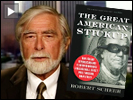Blogger's Note: The FRONTLINE story from which I adapted the graphic below can be found
here.
Greenspan, Summers, and Why the Economy Is So Out of Whack
Robert Reich,
Robert Reich's Blog
Sunday, April 4, 2010
I’m in the “green room” at ABC News, waiting to join a roundtable panel discussion on ABC’s weekly Sunday news program, This Week.
Alan Greenspan is now being interviewed. He says he bore no responsibility for the housing bubble that catapulted the nation into a financial crisis in 2008 because no one could have known about the bubble when he chaired the Fed in the years before it burst. Larry Summers was interviewed just before Greenspan. He said the economy is expanding, that the Administration is doing everything it can to bring jobs back, and that the regulatory reform bills moving on the Hill will prevent another financial crisis.
What?
If any single person is most responsible for the financial crisis, it’s Alan Greenspan. He presided over a Fed that lowered interest rates to zero (adjusted for inflation) but failed to prevent banks from using essentially free money to speculate wildly. You do not have to be a brain surgeon to understand that if money is free, banks will take it and lend it out. And if oversight is inadequate, the banks will lend the money to anyone who can stand up straight and to many who cannot. The result will be a giant subprime lending bubble that will burst.
If any three people are most responsible for the failure of financial regulation, they are Greenspan, Larry Summers, and my former colleague, Bob Rubin. In 1999 they advised Congress to repeal the Glass-Steagall Act, which since 1933 had separated commercial from investment banking. By 1999, Wall Street was salivating over such a repeal because it wanted to create financial supermarkets that could use commercial deposits to place bets in the financial casino. That would yield the Street trillions.
At the same time, Greenspan, Summers, and Rubin also quashed the efforts of the Commodity Futures Trading Corporation to regulate derivatives, when its director began to worry that derivative trading already was getting out of control.
Yet Greenspan continues to take no responsibility for what occurred. In the interview he just completed he avoiding saying anything about the failure of the Fed under his watch to adequately oversee the banks, and the absence of sufficient financial regulation to begin with.
I dislike singling out individuals for blame or praise in a political system as complex as that of the United States but I worry the nation is not on the right economic road, and that these individuals — one of whom advises the President directly and the others who continue to exert substantial influence among policy makers — still don’t get it.
The direction financial reform is taking is not encouraging. Both the bill that emerged from the House and the one emerging from the Senate are filled with loopholes that continue to allow reckless trading of derivatives. Neither bill adequately prevents banks from becoming insolvent because of their reckless trades. Neither limits the size of banks or busts up the big ones. Neither resurrects the Glass-Steagall Act. Neither adequately regulates hedge funds.
More fundamentally, neither bill begins to rectify the basic distortion in the national economy whose rewards and incentives are grotesquely tipped toward Wall Street and financial entrepreneurialism, and away from Main Street and real entrepreneurialism. It was just reported, for example, that America’s top 25 hedge fund managers last year earned an average of $3 billion each. They continue to pay a federal income tax of 15 percent on most of that, by the way, because their lobbying efforts have been so successful.
Meanwhile, the so-called jobs bills emerging from Congress and the White House are puny relative to the challenge of restoring jobs in America. Last Friday’s jobs report, read most positively, showed 112,000 private-sector jobs added to the economy in March. But that’s below the number needed simply to keep up with an expanding population. In other words, we’re actually worse off now than we were a month ago. At the same time, the median wage of Americans with jobs keep dropping.
The American economy is seriously out of whack. The two people interviewed this morning don’t seem to understand how far.
Robert Reich is Professor of Public Policy at the University of California at Berkeley. He has served in three national administrations, most recently as secretary of labor under President Bill Clinton. He has written twelve books, including The Work of Nations, Locked in the Cabinet, and his most recent book, Supercapitalism. His "Marketplace" commentaries can be found on publicradio.com and iTunes.


